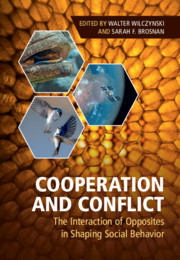Book contents
- Cooperation and Conflict
- Cooperation and Conflict
- Copyright page
- Dedication
- Contents
- Contributors
- Acknowledgments
- Introduction
- Part I Broad Insights from Political Science to Molecular Behavior
- 1 Cooperation and Conflict in International Relations
- 2 Internalizing Cooperative Norms in Group-Structured Populations
- 3 Reputation
- 4 Finding the Right Balance
- Part II Neural Mechanisms
- Part III Species Comparisons
- Index
- References
3 - Reputation
A Fundamental Route to Human Cooperation
from Part I - Broad Insights from Political Science to Molecular Behavior
Published online by Cambridge University Press: 08 February 2021
- Cooperation and Conflict
- Cooperation and Conflict
- Copyright page
- Dedication
- Contents
- Contributors
- Acknowledgments
- Introduction
- Part I Broad Insights from Political Science to Molecular Behavior
- 1 Cooperation and Conflict in International Relations
- 2 Internalizing Cooperative Norms in Group-Structured Populations
- 3 Reputation
- 4 Finding the Right Balance
- Part II Neural Mechanisms
- Part III Species Comparisons
- Index
- References
Summary
Humans are a remarkably social species. They form and live in groups and recurrently have to decide whether to cooperate or compete with others within and among groups. Cooperation has been essential for group survival and prosperity across human history. In hunter-gatherer societies, people need to form alliances in hunting to alleviate the risks from predator attacks. Likewise, modern societies require groups of people to cooperate in large ventures. Yet, social situations often involve a conflict between one’s short-term personal interest and the long-term collective interest (i.e., social dilemmas; Dawes, 1980; Van Lange et al., 2013). In such mixed-motive situations, what is good for an individual may often harm the collective, and this makes people tempted to free ride and harvest the benefits from others’ cooperation. Indeed, many societal problems and global issues (e.g., traffic problems, environmental pollution, and resource depletion) involve such conflicts of interests. Solving these problems often requires individuals to cooperate by paying a personal cost to benefit another person or the group.
- Type
- Chapter
- Information
- Cooperation and ConflictThe Interaction of Opposites in Shaping Social Behavior, pp. 45 - 65Publisher: Cambridge University PressPrint publication year: 2021



